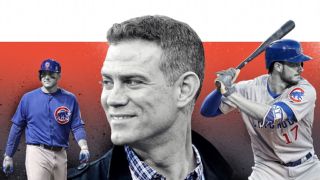|
This story appears in ESPN The Magazine's Nov. 28 Tall Ball Issue. Subscribe today! It has been a few weeks now, and the Chicago Cubs are still World Series champions. And if history is any guide, everything familiar about the identity of the fan base and organization will be erased as the price of that title. The Cubs can no longer mask a century of incompetence with curses, afternoon drinking and low expectations. They've always had the resources of a superpower -- and now they have to start acting like one. Having witnessed the same shift in Boston, Theo Epstein knows this better than most. After almost 100 years of failure, the Red Sox still do business now the same as they did before winning the World Series in 2004-last winter, they signed David Price to a seven-year, $217 million free agent contract, just as they signed Manny Ramirez to an eight-year, $160 million contract in December 2000. But the national sympathy for their eternal heartbreak is gone. Even before Game 7, there was nothing cute or disadvantaged about the Cubs either, as evidenced by their enviable ability to sign Jason Heyward to an eight-year, $184 million contract-and bench him during the World Series. The Red Sox marketed and sold themselves as a ragtag band of rebels fighting both the supernatural and the omnipotent Yankees. Fans of the Rays, who happened to be the real underdogs, even coined a term for Boston's sly deception, referring to them as the Just as Evil Empire. Chicago, like Boston 12 years ago, can no longer claim the image of underdog on the field-especially since the Cubs are far from underdogs on the balance sheet, where they rake in profits. An identity change is coming, and they should embrace it. In this money game, with no salary cap and limited revenue-sharing, the Cubs, in the third-biggest market in the country, should have been dominant for decades. Instead, they were baseball's family screwup, partying with the trust fund money, winding up on academic probation. The generations of fans desperate for a winner have certainly suffered since 1946, but ownership certainly did not. The Cubs have been one of the richest teams in baseball. The team sold in 2009 for $845 million and in March was estimated by Forbes to be worth $2.2 billion, fifth best in MLB. The lovable loser narrative was lucrative-it sold lots of tickets, beer and T-shirts and allowed an enormous fan base to feel sorry for itself-but in reality, the Cubs were cursed only in one way: by their own ownership mediocrity.  Today, they have the opportunity to be the dominant team in the National League-and probably in baseball-for years to come. In Epstein, they have a president of baseball operations who knows how to build a farm system so well he can take big gambles on free agents, and the Ricketts family's enormous resources can help the team survive even a deal like Heyward's. With old money but a new-school attitude, baseball wants its teams built the Epstein way, lest they face oppressive luxury tax penalties. "You have to embrace the suck," Yankees general manager Brian Cashman told me earlier this year. "Look at Theo and the Cubs. They had money, but they built the farm system, lost and lost, and told their fan base the payoff was coming. George Steinbrenner's way is gone. You can't do it that way anymore. That's why we made the Aroldis Chapman deal with them. Embrace the suck. Build the contender." The Cubs can now go back to being the power they once were, for from 1906 to 1945 Chicago went to the World Series 10 times and won it twice. But the opportunity to shed the underdog image will come at an enormous cost: the identity the franchise has cultivated for the past half-century as a great place to start the bachelorette party before the North Side pub crawl kicks into high gear. Perhaps Chicago's transition to superpower won't be as harsh as in Boston, where agony was replaced by pink hats, expensive seats and gentrification (though Wrigleyville already has a leg up on the latter). Maybe the team will maintain its old identity even if it dominates, because so many of its celebrity fans are comedians, and because the beer has always flowed during weekday baseball when everyone else is being killed by office meetings. As expectations undoubtedly rise for the Cubs to stay on top, maybe Chicago will do something truly remarkable: win big while still being best known for having a good time.
|

